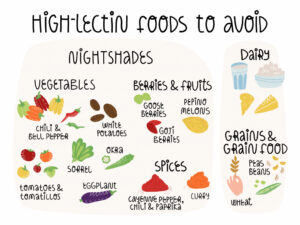In recent years, there has been a growing concern about the impact of grains on our health, with some experts suggesting that they may not be as wholesome as once believed. While grains, such as wheat, rice, and oats, have been dietary staples for centuries, a burgeoning body of research suggests a potential link between their consumption and adverse health effects. There is significant controversy surrounding grains; let’s unravel their connection to Inflammation and pain.
Gluten
One of the primary culprits associated with grains is gluten, a protein found in wheat and other cereals. Gluten intolerance, commonly known as celiac disease, is a well-documented condition where the immune system reacts adversely to gluten, leading to inflammation and damage to the small intestine. However, a broader spectrum of individuals may experience non-celiac gluten sensitivity, a condition characterized by digestive discomfort, joint pain, and fatigue after consuming gluten-containing grains.
Lectins
Beyond gluten, grains also contain other compounds that may contribute to inflammation. Next, I want to touch on lectins. Lectins are proteins found in many grains that can interfere with the absorption of nutrients and potentially cause irritation in the digestive tract. While lectins may confer benefits to the immune system and exhibit some anti-cancer properties, they lack a recognized role in human nutrition. When ingested, lectins bind to carbohydrates and traverse the digestive tract. However, when present in uncooked or undercooked foods in substantial amounts, they can induce symptoms of food poisoning, such as nausea, vomiting, and diarrhea. This can also happen if you have raw beans and do not soak or cook them properly. One doctor goes as far as to say that lectins should be avoided if you are an unhealthy weight. While we must acknowledge that not all diets are for all people, there is some validity to this claim. Legumes, including beans, play a significant role in regulating blood sugar levels, surpassing many other food groups in this regard, so it is always important to use discernment- about what is best for you during each phase of life.

Image rights Dr. Kiltz
https://www.doctorkiltz.com/foods-high-in-lectins/
Additionally, phytates in the outer layers of grains can bind to minerals and inhibit their absorption, potentially leading to nutrient deficiencies that may exacerbate inflammatory processes.
Blood Sugar Spikes
Grains, particularly refined grains, are rich in carbohydrates, which can contribute to spikes in blood sugar levels. High glycemic index foods, such as white bread and sugary cereals, have been linked to increased inflammation in the body. Elevated blood sugar levels trigger the release of inflammatory markers, potentially contributing to chronic inflammation, a known precursor to various health issues, including pain and discomfort.
Nutritional Value
Another factor to consider is the modern processing of grains, which often involves refining and stripping away essential nutrients. This process not only diminishes the nutritional value of grains but also leaves behind a product that may be more likely to contribute to inflammation when consumed regularly. White pasta, white bread, and white rice should all be consumed in extreme moderation or avoided altogether.
Furthermore, the widespread use of pesticides and herbicides in grain cultivation adds another layer to the potential health risks associated with their consumption. Residual pesticide residues in grains may have adverse effects on the gut microbiota, disrupting the delicate balance of bacteria essential for proper digestion and overall health. An imbalanced gut microbiota has been linked to inflammation and various chronic conditions.
While the debate on the health impact of grains continues, it is essential to acknowledge that not all grains are created equal. Whole grains, such as brown rice and oats, contain more fiber, vitamins, and minerals compared to their refined counterparts. (PS..quinoa is not a grain but a seed and fabulous for your health). Choosing whole grains over refined options may mitigate some of the potential negative effects associated with grain consumption but does not negate their inflammatory nature.
In conclusion, the relationship between grains and inflammation is a complex and evolving topic. While some individuals may experience adverse effects from consuming grains, it is crucial to consider individual tolerance levels, overall diet, and the quality of the grains consumed. As with any dietary choices, moderation and a focus on whole, minimally processed foods remain key principles for maintaining a balanced and potentially anti-inflammatory diet.
References
WebMD. (Nov 2022). 6 foods high in lectins and why to avoid them. WebMD. https://www.webmd.com/diet/foods-high-in-lectins




